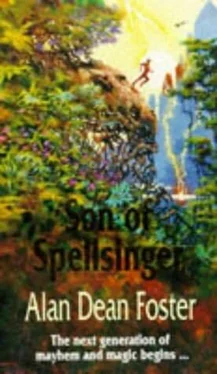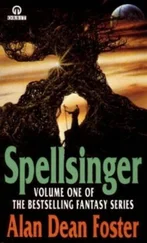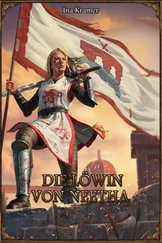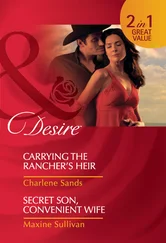neetha Napew - Son Of Spellsinger
Здесь есть возможность читать онлайн «neetha Napew - Son Of Spellsinger» весь текст электронной книги совершенно бесплатно (целиком полную версию без сокращений). В некоторых случаях можно слушать аудио, скачать через торрент в формате fb2 и присутствует краткое содержание. Жанр: Старинная литература, на английском языке. Описание произведения, (предисловие) а так же отзывы посетителей доступны на портале библиотеки ЛибКат.
- Название:Son Of Spellsinger
- Автор:
- Жанр:
- Год:неизвестен
- ISBN:нет данных
- Рейтинг книги:3 / 5. Голосов: 1
-
Избранное:Добавить в избранное
- Отзывы:
-
Ваша оценка:
- 60
- 1
- 2
- 3
- 4
- 5
Son Of Spellsinger: краткое содержание, описание и аннотация
Предлагаем к чтению аннотацию, описание, краткое содержание или предисловие (зависит от того, что написал сам автор книги «Son Of Spellsinger»). Если вы не нашли необходимую информацию о книге — напишите в комментариях, мы постараемся отыскать её.
Son Of Spellsinger — читать онлайн бесплатно полную книгу (весь текст) целиком
Ниже представлен текст книги, разбитый по страницам. Система сохранения места последней прочитанной страницы, позволяет с удобством читать онлайн бесплатно книгу «Son Of Spellsinger», без необходимости каждый раз заново искать на чём Вы остановились. Поставьте закладку, и сможете в любой момент перейти на страницу, на которой закончили чтение.
Интервал:
Закладка:
CHAPTER 8
For a time it seemed as if squill was right to be so confident. The rest of their journey through the Muddletup Moors proceeded without incident, marred only by a damaged wheel that the merchant quickly and efficiently repaired. As they pushed on, Duncan played frequently and the otters sang to keep the enervating atmosphere of the Moors at bay. Of the hounds there was no sign, nor did anything more inimical than a bellicose toadstool attempt to hinder their progress.
Eventually they emerged from the dour surroundings of the Moors onto a wide, lightly vegetated plain that was different from any country Buncan or the otters had ever seen. Having grown up in the lush confines of the Bellwoods, they were immediately intrigued by the stunted trees and dense, dry-leaved bushes and grasses that covered the land.
“Oi, is this the desert?” Neena asked wonderingly as the wagon rattled down the barely visible track. “I’ve ‘eard about the desert, I ‘ave.” Behind them a low bank of permanent, purulent fog obscured the western reaches of the Moors. Bright sunshine had banished the last psychic echoes of manic-depressive fungi from (heir minds. It was a pleasure to let down their mental guard.
Pirouetting breezes swept blue-stained dirt into occasional dust devils. Broad-winged flying lizards sculpted predatory patterns in the air, searching for smaller, gravity-bound prey below. Slim, hasty creatures with multiple legs scurried out of the wagon’s path to vanish down camouflaged holes and burrows.
“No, this isn’t the desert,” Gragelouth patiently explained. “There’s far too much water present, and the abundance of plants reflects that. I would call this upland scrubland.”
He nodded in the direction of high, chapparal-covered mesas. Where flowing water had eroded the hillsides multicolored sandstone sparkled in the sun like the layers of a coronation cake. “Pretty, that.”
Buncan agreed, and would have enjoyed spending a day or two exploring such country, but they had no time to linger. In any event, the otters did not share his enthusiasm for casual sight-seeing. The absence of running water made them nervous.
The landscape changed little over the next few days. Desert it might not be, but it was more than hot enough for everyone. Fortunately, water in greater quantities soon showed itself in the small streams that ran down from the mesa tops, and in shaded pools deep enough to offer the otters an occasional reinvigorating plunge.
“Doesn’t anyone live out here?” Buncan asked the question of their guide on the fourth day out from the Moors. The wagon squeaked in counterpoint to his query.
“There are tales of communities,” Gragelouth replied, “but this is little-known country. Civilized folk keep to the Bellwoods, or travel south to the Tailaroam and thence down to the Glittergeist or up the river to Polastrindu.”
“Don’t see why anyone would choose to live ‘ere.” Neena sniffed distastefully as she studied the uninviting terrain. “Too dry, too isolated, wot?”
“Some people prefer isolation,” the merchant told her. “I have traded with such.”
“Each to their own tastes, I suppose.”
“This track we’re following must run somewhere,” her brother observed sagely, “little used though it is.”
Sure enough, not another day had passed before they topped a low rise between boulders that gave way to a view of a verdant valley. Two broad streams meandered through well-tended fields, which surrounded a town of surprising dimensions.
Behind a smooth-faced white wall with a curved crest towered buildings of three and four stories, all plastered and painted the same stark, reflective white. Under the midday sun the city shone so brightly that the approaching travelers had to shield their eyes against it. Gragelouth in particular suffered considerably.
Like everything else, the sight only served to inspire the otters. “Where’s this, or maybe I should say, wot’s this?” Squill’s short tail twitched excitedly.
“I do not know,” the merchant admitted. “As I have already said, I have never been this way before.”
“Sure is well kept-up,” Buncan commented as they followed the faint wagon track toward the nearest city gate. He was well aware that the otters were avidly eyeing the nearest of the two main streams. “I don’t know about anyone else, but I could do with a swim.”
Tentative as always, Gragelouth pursed thick lips as he considered the prospect. “The local farmers may not like people bathing in their irrigation water.”
“Chill out,” Squill admonished him. “We’ll turn off before we reach the city wall and slip in somewhere upstream. No one’ll see us.”
“They may not mind. The community looks quite prosperous,” Gragelouth had to admit.
As Squill surmised, their brief swim passed unnoticed. All were in high good spirits as they dried themselves in the sun while the merchant drove the wagon back toward the city. There were numerous tracks to follow now. Farmers’ wagons, Buncan thought.
As they approached a city gate other vehicles could be seen entering and leaving: wagons piled high with produce or supplies, two-wheeled carts, riders on individual mounts, preoccupied pedestrians. As was typical, Buncan was taller than any of them. His unusual height, he knew, was a gift of his father’s otherworldly origins.
It was Squill who first noticed the anomaly.
“Crikey,” he exclaimed in surprise as they drew near enough to distinguish individuals. “They’re all bloody rodents!”
It was true. The city was populated entirely by rats, mice, squirrels, and their relations. There were no canines, felines, primates, or ungulates; no representatives of any of the other great tribes of the warm-blooded. Such species isolation was unprecedented in their experience. It was almost as if the inhabitants had chosen to segregate themselves. Despite the city’s evident prosperity, Buncan knew that such a sequestered population would inevitably make for cultural famine.
Back in the civilized world the representatives of the rodentia had often been looked down upon, until they had helped to turn the tide against the Plated Folk at the battle of the Jo-Troom Pass. So it was most unexpected to find so many of them living like this, isolated from the great and wondrous diversity of the wider world.
Neena was standing on the cushions back of the bench. “Look at them. No expressions o’ individuality at all.”
Indeed, regardless of tribe everyone mey saw was clad entirely in white sheets or robes. These extended in unbroken fashion from head to foot save for slits for ears and tail, and an oval opening for the face. White sandals shod feet regardless of size or shape. Within this all-pervasive whiteness there was room for some variation, with buttons, belts, lace, and other trim of exquisite detail and design providing the only distincti veness in the absence of color. In addition to then: voluminous robes, some additionally wore masks or scarves of embroidered white, perhaps to keep out the dust while working in the fields, Buncan surmised.
More notable even than the unvarying whiteness was the immaculate condition of the city and its citizens. Buncan could not find a spot of mud, a chunk of decaying plaster, or a blighted structure anywhere as they passed through the unbarred gate into the city proper. A pan- of squat capybara guards followed the wagon with their eyes but made no move to confront it. Then- ceremonial pikes were fashioned of bircli wood tipped with blades of sharpened milk quartz.
A warren of structures began immediately inside the gate. Modest or excessive, all were plastered or painted white. Awnings of white cloth shaded small street-side stalls or upper-story windows framed with intricately carved white shutters. The street down which they plodded was cleaner than the tables of most taverns in Lynchbany.
Читать дальшеИнтервал:
Закладка:
Похожие книги на «Son Of Spellsinger»
Представляем Вашему вниманию похожие книги на «Son Of Spellsinger» списком для выбора. Мы отобрали схожую по названию и смыслу литературу в надежде предоставить читателям больше вариантов отыскать новые, интересные, ещё непрочитанные произведения.
Обсуждение, отзывы о книге «Son Of Spellsinger» и просто собственные мнения читателей. Оставьте ваши комментарии, напишите, что Вы думаете о произведении, его смысле или главных героях. Укажите что конкретно понравилось, а что нет, и почему Вы так считаете.












